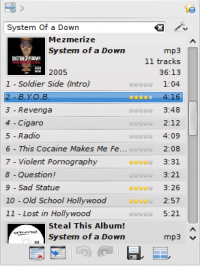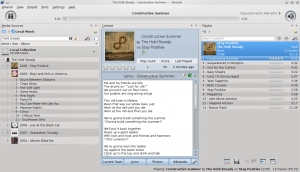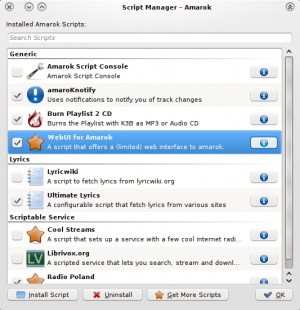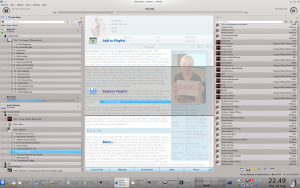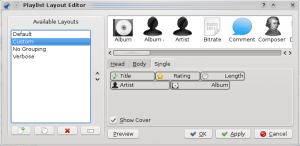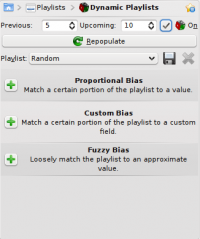Amarok/fr: Difference between revisions
(Created page with "===Services internet===") |
(Created page with "===Gestionnaire de scripts===") |
||
| Line 74: | Line 74: | ||
|} | |} | ||
=== | ===Gestionnaire de scripts=== | ||
{|class="vertical-centered" | {|class="vertical-centered" | ||
Revision as of 12:48, 3 May 2011

|
Amarok est le lecteur de musique de la communauté KDE |
Amarok est un lecteur audio puissant, polyvalent, multi-plateforme, libre et riche en fonctionnalités. Il permet une gestion facile de votre collection, récupère automatiquement les informations et les pochettes d'albums et intègre nativement le support de services comme Jamendo, Last.fm, Magnatune et Librivox. Vous pouvez également le personnaliser pour le faire correspondre à vos besoins. La version stable actuelle est la version 2.4.
Si vous utilisez Amarok pour la première fois, vous devriez regarder le Guide de démarrage rapide d'Amarok.

Interface
Amarok possède une interface en trois volets par défaut.
Le panneau de gauche (Sources de médias)
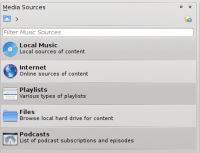 |
The Media Sources pane on the left is the place where you access your local collection as well as other services: on top, which is the primary interface to your local collection and connected media such as mp3 players and CDs. There is a section for all that you have enabled. Here, you can browse listings of radio stations and podcasts; listen/subscribe to them, interact with your last.fm account, purchase music from online stores such as Magnatune and download independent artists' music from Jamendo and more. The section allows you to create and manage Dynamic Playlists, access your Saved Playlists as well as the Automatic Playlist Generator. The section displays an integrated file browser and the section will let you access your podcast subscriptions. |
Le panneau central (Vue contextuelle)
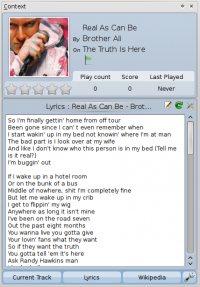 |
This is where all the information is displayed. The central pane contains 3 applets that dynamically change to display context information about the track that is currently playing. You can see the rating, score and play count of the Current Track applet or the last played tracks if nothing is playing, the Lyrics of the song and the Wikipedia page on the artist. More applets can be added, removed or rearranged using the Applet Bar at the bottom of the pane. |
Le panneau de droite (Liste de lecture)
Fonctionnalités
Lecture
Support de périphériques
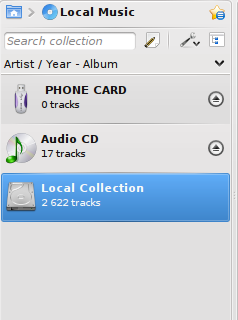 |
Amarok offers support for a great variety of Media devices such as iPods, MTP and UMS devices.
The button at the top of the collection lets you merge collections. This means songs from your local collection, audio CD, mp3-player and so on will be shown in one unified collection. It is a toggle switch so you can easily revert to showing the separate sources. |
Vue contextuelle configurable
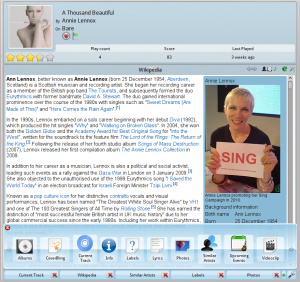 |
The Context view, the centerpiece attraction in Amarok, can automatically fetch contextual information about the currently playing song (such as album art, lyrics or Wikipedia information) from the Internet and display them. This is one of the unique features of the Amarok series. |
Services internet
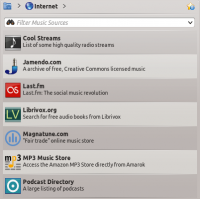 |
Amarok opens the gateway to a rich multimedia experience on the Internet.
And that is just the beginning — you can add even more Internet services using the . |
Gestionnaire de scripts
Cover Manager
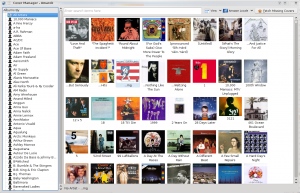 |
You can browse through your music collection using the nifty that displays the album art, download covers from various sources or let Amarok check automatically for covers in the internet. |
Rating and scoring
Pop-Up Dropper
Configurable Playlist View
Dynamic Playlists
Replay Gain Support
Amarok supports Replay Gain tag information embedded in files and automatically adjusts the overall volume of the song to a common level.
Rediscover your music!
Hints, Tips and FAQs
If you find that most of your music is recognized by Amarok, but some folders are not properly picked up, open a console and type
touch folder
where folder is the path to the folder that has the problem. Then select in Amarok main window menu, and open page. Your folder should be visible again now.
Warning: this will not work on Windows, as the touch command is specific to Linux and BSD-like systems.
Tutorials
More Information
![]() Support for this application can be found from the project's home page
Support for this application can be found from the project's home page

